
| WB | 咨询技术 | Human,Mouse,Rat |
| IF | 咨询技术 | Human,Mouse,Rat |
| IHC | 1/100-1/300 | Human,Mouse,Rat |
| ICC | 技术咨询 | Human,Mouse,Rat |
| FCM | 咨询技术 | Human,Mouse,Rat |
| Elisa | 1/10000 | Human,Mouse,Rat |
| Aliases | ZNF75D; ZNF75; ZNF82; Zinc finger protein 75D; Zinc finger protein 75; Zinc finger protein 82 |
| Entrez GeneID | 7626; |
| WB Predicted band size | 40kDa |
| Host/Isotype | Rabbit IgG |
| Antibody Type | Primary antibody |
| Storage | Store at 4°C short term. Aliquot and store at -20°C long term. Avoid freeze/thaw cycles. |
| Species Reactivity | Human |
| Immunogen | Synthesized peptide derived from the C-terminal region of human ZNF75. |
| Formulation | Purified antibody in PBS with 0.05% sodium azide,0.5%BSA and 50% glycerol. |
+ +
以下是关于ZNF75抗体的3篇示例参考文献(内容为虚构示例,实际文献需通过学术数据库检索确认):
---
1. **文献名称**:**"Characterization of a Novel Monoclonal Antibody Against Human ZNF75 for Epigenetic Studies"**
**作者**:Li et al. (2020)
**摘要**:本研究开发了一种针对人源ZNF75蛋白的单克隆抗体,通过免疫印迹和免疫荧光验证其特异性。该抗体成功用于检测ZNF75在多种癌细胞系中的核内定位,并揭示其通过与染色质修饰复合物相互作用调控基因沉默的功能。
---
2. **文献名称**:**"ZNF75 Antibody-Based Profiling Identifies Its Role in Hepatocellular Carcinoma Metastasis"**
**作者**:Wang et al. (2018)
**摘要**:利用ZNF75特异性抗体分析肝癌组织样本,发现ZNF75表达水平与患者预后呈负相关。实验表明,ZNF75通过抑制EMT(上皮间质转化)相关基因的转录,减缓肿瘤转移进程。
---
3. **文献名称**:**"Development of a Polyclonal Antibody for ZNF75D Isoform and Its Application in Neuronal Differentiation Studies"**
**作者**:Garcia-Ruiz et al. (2016)
**摘要**:本研究报道了一种针对ZNF75D亚型的多克隆抗体制备方法,验证其在人脑组织中的特异性表达。通过该抗体发现ZNF75D在神经元分化过程中调控突触相关基因的表达。
---
**备注**:以上文献信息为示例,实际研究中请通过PubMed、Google Scholar等平台以“ZNF75 antibody”或“ZNF75 function”为关键词检索最新文献,并注意核对抗体的物种特异性(如人、小鼠等)及研究背景相关性。
The ZNF75 antibody is designed to target the zinc finger protein 75 (ZNF75), a member of the Krüppel-associated box (KRAB) domain-containing zinc finger protein family. ZNF75. encoded by the ZNF75A gene in humans, is located on chromosome 19q13.3 and is characterized by multiple C2H2-type zinc finger motifs, which are typically involved in DNA binding and transcriptional regulation. While its exact biological function remains incompletely understood, ZNF75 is hypothesized to participate in gene expression modulation, potentially acting as a transcriptional repressor through interactions with chromatin-modifying complexes.
Antibodies against ZNF75 are primarily utilized in research to detect and quantify its expression in cellular and tissue samples, aiding in studies of its localization, expression patterns, and potential roles in disease. For instance, ZNF75 has been investigated in cancer research due to its genomic proximity to tumor suppressor regions and possible involvement in oncogenic or tumor-suppressive pathways. Some studies suggest altered ZNF75 expression in malignancies, though mechanistic insights remain limited.
Commercial ZNF75 antibodies are typically validated for applications such as Western blotting, immunohistochemistry, and immunofluorescence. Researchers emphasize the importance of antibody specificity due to the high homology among zinc finger proteins. Ongoing work aims to clarify ZNF75's physiological and pathological contributions, particularly in development, cellular differentiation, and disease progression, highlighting the antibody's utility as a critical tool in molecular and cellular biology investigations.
×